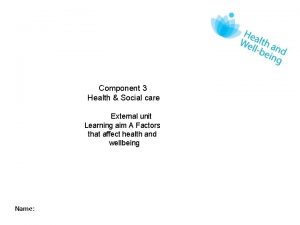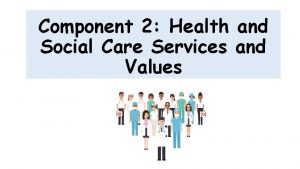Component 2 Health and Social Care Services and









- Slides: 9

Component 2: Health and Social Care Services and Values

Learning Outcome: • To be able to identify a range of services available for adults or children with specific needs as well as being able to identify the difference between disabilities and long-term health problems. Key words: Social care, support, services, emotional, respite care, domiciliary care, residential.

Find definitions of each and examples to support. Definition Learning disability Sensory disability Long-term health problem Examples

Definition Examples Learning disability A learning disability is a reduced intellectual ability and difficulty with everyday activities – For example household tasks, socialising or managing money – which affects someone for their whole life. • • • Dyslexia Sensory disability Sensory impairment is when one of the senses; sight, hearing, smell, touch, taste and spatial awareness, is no longer normal. • • • Blind / Visually Impaired Long-term health problem Also known as a Chronic Condition is a health problem that requires ongoing management over a period of years or decades. • • • Dementia Cerebral Palsy

Match Up Diabetes Autism Blindness Depression / Anxiety Deafblind Aspergers Syndrome Dyscalculia Learning disability Hearing Loss Dyslexia Dysgraphia Long-term health condition Sensory disability High Blood Pressure Rheumatoid Arthritis Multiple Sclerosis Osteoarthritis ADHD Sensory Processing Disorder

Answers! Check your answers are correct

Types of care Residential care Respite care Care homes, also known as adult family homes, board and care homes, residential care or personal care homes offer personalized service to small groups of adults. These residential homes provide lodging, meal services and assistance with daily living activities. Respite care is planned or emergency temporary care provided to caregivers of a child or adult. It allows the carer an opportunity to take a short break from being a carer so they can take care of their own needs and have a short break from their day-to-day struggles/difficulties. Domiciliary care is defined as the range of services put in place to support an individual in their own home. Services may involve routine household tasks within or outside the home, personal care of the client and other associated domestic services necessary to maintain an individual in an acceptable level of health, hygiene, dignity, safety and ease in their home. Task: Discuss how each of these types of care could be useful for individuals with either a learning disability, sensory disability or long-term health condition.

Health Conditions On the right hand side, there are three examples of individuals with different health conditions. Image 1: Young girl with Down’s Syndrome (Learning Disability) Image 2: Young boy who is deaf (Sensory Loss) Image 3: Young boy who has cerebral palsy (Long-term Health Condition) In pairs, you will be given a particular image to focus on. You should: • Find more about the condition that the child has • Identify their potential needs. • Research the suitability of types of social care services for them. (E. g. respite, residential, domiciliary).

Plenary • Group up with two people who were focusing on a different condition to you. • Discuss your findings and explain which types of care were suitable for your individual. • You each have two minutes to feedback. The others listening should make notes of the types of care which are useful for the individual and why.
 Health and social care component 3
Health and social care component 3 Btec
Btec Health and social care component 2 learning aim b example
Health and social care component 2 learning aim b example Health and social care values unit 2
Health and social care values unit 2 Primary secondary tertiary care nursing
Primary secondary tertiary care nursing Appraisal in health and social care
Appraisal in health and social care Sam and verna coursework
Sam and verna coursework 770 ilcs 23/50
770 ilcs 23/50 Definition of primary health care services
Definition of primary health care services Component of community health nursing
Component of community health nursing

















